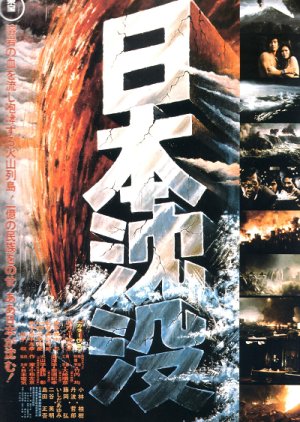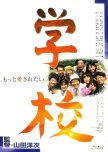
JohnnyRobinson
1 oamenii au considerat această recenzie utilă
A tribute to film-making in this time period and Japan in the 70s
It was my turn to furnish a movie for a group's Saturday night showing; and it went really well with the group!BACKGROUND: Japan is on a destructive plate boundary, where the Philippine Sea Plate subducts the Eurasian Plate. It is a triple junction and three subduction zones are involved. The movie has historical significance both in the far past and more recent; in 2011, in 2011, the Tōhoku earthquake and tsunami, towns like Ishinomaki subsided. 'Subsidence' is a general term for downward vertical movement of the Earth's surface, which can be caused by both natural processes and human activities. Subsidence involves very little horizontal movement, which distinguishes it from slope (horizontal) movement.
For its time period, the cinematography is very good, plus what I like is the Japanese use of "model' terrain and cities, which were prevalent in the 1960s/70s as a standard way of showing mass destruction of cities, towns, countryside fires and tsunami damage (as most films of this era did). It brings back memories of my childhood seeing these models being used in era pictures going back as far as the 50s. If you want a look at movie-making in this time period, try this movie!
What I also liked about this film is that I knew absolutely no one starring in it, which made it seen so much more real; this makes the movie more believable on one level. While some would criticize this, it makes the movie more believable to e and other who were watching.
Everyone was sitting on the edge of their seats, anticipating what would happen next, and surprised when things happened "earlier" than they would anticipate them.
I also read about it before I showed the movie, and it is a good representation of Japanese culture at the time.
Other pluses: the few women in the movie kept their clothes on, and no one was cheating on their Significant Others as well!
Take a chance and see a great film about Japan and see what movies looked like in the late 50s to mmid-70s....
RE-WATCH VALUE: Definitely, especially for a group of different aged people who want to watch the same movie!
Considerați utilă această recenzie?

DanTheMan2150AD
0 oamenii au considerat această recenzie utilă
What is it that we protect? The life and assets of our people?
With a title that literally translates to Japan Sinks, you'd be hardly surprised that the film eventually delivers on this title. The first of many adaptations of Sakyo Komatsu's original works, Submersion of Japan stands above most disaster movies by approaching an honestly terrifying situation with calm intelligence and asking many difficult questions along the way.Racked by earthquakes and volcanoes, Japan is slowly sinking into the sea. A race against time and tide begins as the scientists work together to salvage some fraction of the disappearing Japan.
Following an unsuccessful deal with Daiei, the film rights for the novel were sold to Toho, and those rights extended to the production of a television series, which would be filmed alongside the movie and shared some of the same cast as a result. A series I plan to get to one day if I can ever find working subtitles for. It would be the first big adaptation of the book with a film remake and parody both being released in 2006, two live-action television series and an anime to boot.
With a screenplay written by Shinobu Hashimoto, a frequent Kurosawa collaborator and substantial input from the original author, Submersion of Japan tells its story from a variety of differing viewpoints from a scientist to a submarine operator to the Prime Minster himself. Like the later released Prophecies of Nostradamus, it's not all doom and gloom despite the subject matter, there is some semblance of hope sprinkled throughout. It's not a film written from the perspective of the common citizen, more so the higher-ups in trying to organise impossible tasks.
It tackles many real-life issues that could we as a species could face in our lifetime, subjects such as the reaction of countries trying to accept a mass migration of an entire nation, the fears and anxieties of the nation's people being forced to leave their homeland behind and how it affects them etc. It's a very different type of disaster film that we are used to today, where in those disaster sequences usually play second fiddle to the story at hand.
This is my first exposure to director Shirô Moritani, and hopefully not the last, and he honestly delivers some utterly beautiful direction, especially for a film of this genre. With long sweeping landscape shots coupled with some brilliantly filmed scenes of characters simply talking, it's a pretty substantial film hardly letting up the intensity of the subject matter thanks in part to the commitment of its cast. The usual cast of Toho and Toei regulars make their appearances known, you may not remember all their names by the end but you'll for sure remember their characteristics. Be it the OG Kamen Rider actor Hiroshi Fujioka or others such as Tetsurō Tamba, Keiju Kobayashi and Shôgo Shimada, every single actor delivers an excellent performance.
Released the same year as the 13th entry in the Godzilla series, Godzilla vs. Megalon, it's very clear which one of the two benefits from an actual budget. When it comes down to it, Submersion of Japan puts that money front and centre allowing the creative roots of effects director Teruyoshi Nakano to absolutely shine. Coupled with extra input from eventual Return of Godzilla director, Koji Hashimoto, the film's disaster set pieces are truly a sight to behold, especially that of the Tokyo earthquake sequence which is horror incarnate. No wonder a lot of the footage would be used by later Toho SFX movies.
This is easily the best musical score I've heard from Masaru Sato, it's dark, brooding and equal parts intense, rarely letting up to drive home that feeling of hopelessness experienced by the characters. I've not been a massive fan of his works over the past few films I've seen he's contributed to, but at long last, I've found one of his contributions that I really like.
Overall, while I can see why people rate this one so highly, I find it way too invested in many of its long and very drawn-out situations of characters talking to give it anything higher than 4 stars. Nonetheless, it's still a glorious film from start to finish and should definitely be experienced by any fan of the tokusatsu or the disaster genre.
Considerați utilă această recenzie?








































